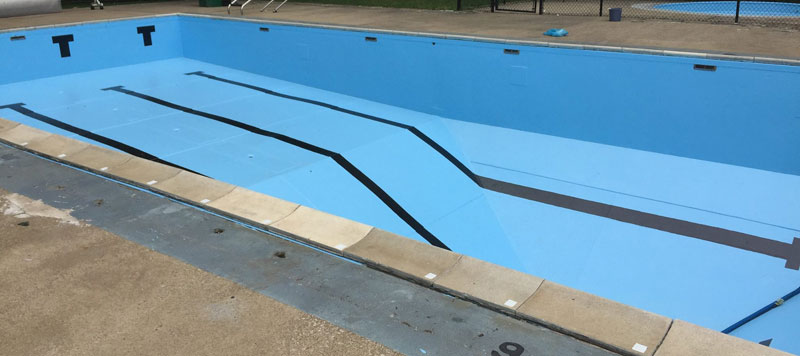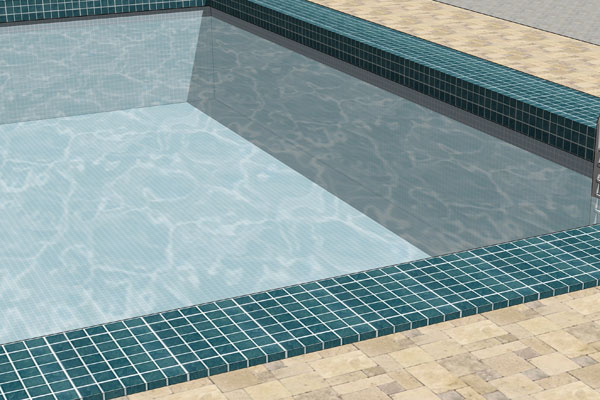Waterproofing protection for swimming pools is pivotal as water places serious loads on the swimming pool structure and is an aggressive factorboth for its frame and for all materials used in its construction. The article deals with the swimming pool construction materials, and different waterproofing systems and products that could offer protection.
A swimming pool is a water-retaining structure used for purposes such as leisure and exercise. There are many different types such as Private pool, Public pool, Competition pool and infinity pool. Swimming pools are constructed using Concrete, concrete + brick/block, Fibreglass, Vinyl-lined pools, Gunite pools, etc. Among all these, more commonly used is the concrete pool. Pools can be sunk into the ground or built above it, as a freestanding construction or as part of a building like a ship. If water leaks IN or OUT, ships sinks, meaning pool fails.
Concrete pools are constructed by a pre-decided number of processes. This takes many days to a few months depending on the size of the pool. Hence, there were few points to be considered to ensure the pool is watertight. Critical locations of the pool, say construction joints, pipe penetrations, corners, miscellaneous fittings like rails, lightings and surface of the pool shall be properly treated to make them watertight.
Water leaking in swimming pools and how to waterproof it?
Water Leakage is one of the major problems in swimming pools caused due to the flaws in construction methods. The right design, construction steps, waterproofing and tiling system can prevent a lot of structural problems and also in saving money and time.
Factors that can lead to leakages are:
- Shrinkage cracks that appear during the concrete curing process
- Lack of waterproofing barriers between the pool water and concrete wall
- Failures in plumbing and suction lines
- The formation of honeycombs during the concreting process, which weaken the structure
- Construction joints
- Pipe Penetrations
At the time of construction, joints in the concrete are unavoidable. Joints due to delay in construction, due to limitation of the concrete pour, due to dis-similar material used. These critical locations can be made water-tight using swellable water-bars. Polymer technology-based water-bars installed on the dry surface of the concrete / any material, and then if concrete poured, make the location water-tight. When water at these locations enters, water-bars swell by 3-4% in volume and block water flow.
At the pipe penetrations, water bars are very useful as they are very easy to install at the site level. After the construction, at the time of coating, a flexible polyurethane sealant is applied at the pipe penetrations, seals the junction and serves the purpose of water-tightness.
Construction joints, after the pool construction, shall be cut open in the form of a “V” groove and filled with polymer modified mortar or SBR admixed mortar. This treatment not only provides a uniform surface for the coating but also ensures the less permeable mortar filing at joints. Concrete, no matter how closely supervised for good workmanship, it is expected to have honeycombs and air gaps at junctions. So, it is strongly recommended to use a vibrator at the time of construction and do pressure grouting after the construction.

Important considerations for waterproofing swimming pools
The waterproof system shall be able to withstand the hydrostatic pressure of min 2.5 bars. This may be achieved in the waterproofing membrane by applying the best primer/sealer coat before the waterproof sheet membrane.
While waterproofing, corners shall be treated using thermo-plastic-elastomer tapes, as we know that stress and strains are more at the support/junction of the concrete structure which results in cracks formation.
The pool is a water-retaining structure and it needs to be cleaned at regular intervals. So, the surface of the pool shall be provided with such a system, which provides durable, easy to clean, withstand chemicals affect, no color change, and food grade. Tiles can fulfill these requirements. Pools can be installed with tile using tile adhesive. Tile adhesive used for pool tile installation shall be high polymer content and pass the bond strength in water immersed testing.
At the time of the installation of tiles, a minimum of 2-3mm joints shall be maintained and shall be grouted with food-grade epoxy or polymer-rich cement grout.
Ardex Endura Swimming Pool Systems
With so many options available, it is best to consult an expert to ensure that the most ideal waterproofing solution to be implemented which is also compatible with the other elements in the swimming pool construction. One such group is Ardex Endura, India. They have a range of waterproofing, tiling and concrete repair products for your swimming projects.
For swimming pool at ground level, they offer-
- External waterproofing coating WPM 810
- Construction joint treatment WPM SW Series
- Leveling mortars
- Internal waterproofing coating WPM 002
- Sealing tape WPM 324
- Tile adhesive DIAMOND STAR
- Tile joint grout EPOXY GROUT
For a wide array of portfolio of products encompassing, Tiling & Stone Care products, Industrial & Commercial Flooring Solutions, Waterproofing Systems, Concrete Repair and Decorative finishes, you can visit their website- https://www.ardexendura.com/






